BestReviews is reader-supported and may earn an affiliate commission. Details
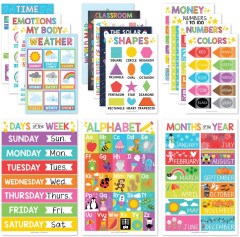
A perfect poster set for younger kids that will help them understand lessons while also serving as a great decoration piece.
A perfect poster set for younger kids that will help them understand lessons while also serving as a great decoration piece.
High-quality materials make it a durable choice. Perfect for grades 3 and under. Has multiple subject posters including math, English, and geography. Colors and design make this a great decoration choice.
Not all the posters are suitable for 2nd and 3rd grade.
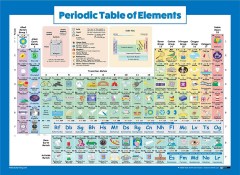
An inviting, 2-sided, heavy-duty poster that is easy for young children to understand.
An inviting, 2-sided, heavy-duty poster that is easy for young children to understand.
Bright colors and vibrant pictures help students conceptualize the periodic table. This thick poster is laminated for protection from tears and stains. Can be hung with or without a frame. Can be viewed on one side for a simpler view of the periodic table while the other side is for more in-depth learning.
Atomic mass is not listed, making this not so suitable for advanced science classrooms. Since it is 2-sided, it may not be suitable to stick to the wall.
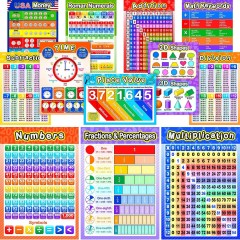
A colorful set of handy visual aids for young math students.
A colorful set of handy visual aids for young math students.
This 12-piece set covers many education basics, including fractions, time, money, and multiplication tables. Posters are made of cardstock covered with waterproof film. Easy to read.
These cards are smaller than most posters, though many people find them ideal for younger hands. Some say the included glue dots are not helpful for mounting.
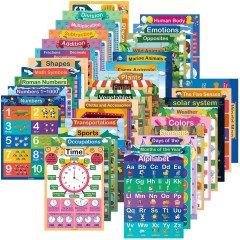
An extremely versatile product thanks to the number of posters available with a single purchase.
An extremely versatile product thanks to the number of posters available with a single purchase.
The 35 different posters ensure that every part of a child’s education is covered. Easy to apply onto the walls and can be taken off with little to no marks left behind. Posters are large and easy to read from a distance.
Not the highest-quality material makes it prone to scratches and tears.
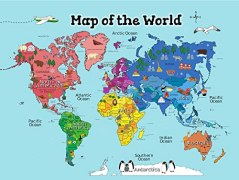
An inviting world map that's easy to read and understand.
An inviting world map that's easy to read and understand.
Bright colors and brilliant pictures help students conceptualize the continents. This thick poster is laminated for durability. Great price.
Some countries are omitted. The map is occasionally updated by the manufacturer.

We recommend these products based on an intensive research process that's designed to cut through the noise and find the top products in this space. Guided by experts, we spend hours looking into the factors that matter, to bring you these selections.
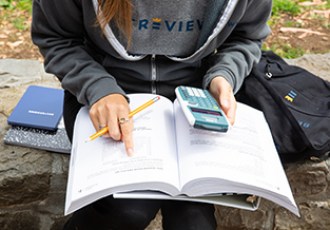
When it comes to teaching, a good picture really is worth a thousand words. Most teachers can deliver between 100 and 150 words per minute, but that doesn’t mean students can absorb every syllable.
Displaying a quality educational poster in your schooling space can jog students’ memories, fill in learning gaps, and help learners visualize larger-than-life concepts. It can aid you in setting the tone for learning, whether you work in a traditional classroom or a home education nook. A colorful, well-designed poster invites students to take a closer look. What’s more, it gives kids with different learning styles and challenges another way to take in and process key information.
Learning is critical to each child’s development and success. Therefore, it’s important for teachers to find resources that support their learning and spark their imagination.

Your wall space and budget may be limited, so it’s important to keep your students and curricula in mind as you shop.
Younger elementary children usually enjoy posters with bright colors and smiling faces. Text should use simple language and be presented in large, easy-to-read fonts. Middle school students, on the other hand, may bristle at colorful posters they consider juvenile. While color contrast is important for easy reading, consider skipping primary colors and simplistic layouts for this age.
High school students may not be as choosy about color and font, but the posters made for them often include more words and information. Text may be smaller, but it must still be clear and easy to read.
Walls plastered with too many visual aids can be overwhelming, so narrow your focus to educational posters that match your teaching material. For example, if your in-school classroom is dedicated to mathematics, stick to that subject. If you’re an elementary teacher who must cover all the bases, consider a diverse selection that helps cover the basics when they can’t get to every question.
Homeschool teachers can provide more focused attention and can refer children to books and websites that don’t sacrifice wall space. Therefore, homeschool students may benefit more from maps and other posters that engage personal or regional interests and draw kids in to explore.
Words are the building blocks of the ideas your students will use for life, so it’s important to create a strong foundation. Posters that depict basic phonics concepts, letters, parts of speech, prefixes and suffixes, noun-verb agreement, and other key concepts are good choices for elementary classrooms. Older students may benefit from posters that reinforce good grammar, help with literary analysis, or suggest replacements for simple, overused words. Aids that sort out higher-level linguistic concepts or literary devices can help even high schoolers.
Educational posters that help students memorize math facts, place values, and Roman numerals can set elementary students on the road to success. Visual aids can help older students remember orders of operation, work with geometric shapes, or use formulas to calculate area, volume, and more. A poster with metric conversions may also be helpful in a high school classroom.
Technological advances have taken the old-school classroom map from your childhood to a new level. National and continental maps that colorfully designate political boundaries are good for younger children, but older kids need to understand how their home fits into the world around them, so look for global maps as students advance. Resources that focus on topography can help students understand how landforms and natural resources influence culture and economics.
Many complex scientific topics are best explained visually, and posters are a great way to demonstrate these abstract, larger-than-life ideas. Younger students may enjoy visual aids explaining plant life cycles and photosynthesis, planets and their moons, and other on-level topics. Middle school kids can benefit from visualizing hard-to-observe concepts like water cycles, the layout of the earth’s crust, and the ocean floor. Charts labeling human anatomy, listing the elements of the periodic table, and displaying physics equations are natural high school choices.
Finding the right poster is only half the battle. Keeping it on your wall, and in good shape, is the other half. Specific features will help prolong your educational poster’s usable life.
Posters that are laminated resist moisture and tears better than plain paper displays. They’re also heavier, which can increase shipping costs and make them harder to keep on the wall. Still, we recommend springing for laminated posters unless you plan to display them in protective frames.
Educational posters are notoriously hard to ship due to their size and flat surface area. Larger posters are best protected when rolled in a tube for shipping, but they may stay curled for a while, especially if they’re thick. Smaller posters may ship flat, which prevents curling but allows for damage if handled carelessly. Avoid posters that are folded for shipping; materials that hold a crease this long may be hard to keep flat on the wall.
Falling posters are a distraction, and the impact of a fall could damage poster material. A handful of educational posters include adhesives or special clips for use with nails or screws. Make sure the clips don’t obscure the information you want to display. Also note that sometimes, poster adhesives don’t actually work, and you need to buy something stronger.
Multipack: If you’re still having trouble choosing a poster, consider a multipack. An assortment can give students exposure to more concepts and spice up your learning space.
Legibility: Don’t ignore font size and style. Effective posters are legible at a reasonable distance.
Frame: A poster frame can prevent damage and hanging frustrations, but frames aren’t available in every poster size.
Quality posters aren’t the only upgrades that breathe new life into your learning space. Make your students’ day more fun, and yours a little easier, with these accessories.
Globe: Maps have benefits, but they can only go so far. A globe can help kids get a better idea of the scale of the planet and eliminate common size distortions.
Pocket chart: Calendar literacy is a basic life skill. Help your student build knowledge with this tool, which also helps them associate weather, seasons, and holidays. Each chart comes with more than 130 color cards and hangs easily using built-in grommets.
Pencil sharpener: There’s nothing quite like a freshly sharpened pencil.
Inexpensive: You can find display-worthy educational posters for $10 to $15. In this price range, you will find mostly individual posters, such as a map or scientific display. In terms of size, most range from 11 x 13 inches to 18 x 24 inches. They may or may not be laminated.
Mid-range: For $15 to $25, you’ll find single science posters and maps larger than 18 x 24 inches and multipacks of smaller elementary school posters.
Expensive: The priciest educational posters cost $25 or more. You’ll also pay this much for multipacks of large, laminated science posters. Most will be topic-specific and generally aimed at high school students.

Q. What’s the best method for hanging a poster on a wall?
A. For a lighter poster, you can apply an adhesive such as double-sided tape, glue dots, or poster tack to the back. For a heavier poster, you may prefer to use pairs of adhesive wall strips outfitted with Velcro patches. There are also some posters that lock into place with magnets.
The heaviest posters can be framed for easy hanging. These weighty wall adornments may be mounted with Velcro, magnet hangers, or picture hardware.
Q. How much adhesive do I need?
A. It depends on the size of your poster. Apply a strip of adhesive to each corner and the midpoints. Posters with sides longer than 2 feet may require two strips of adhesive spaced evenly along each side rather than one central strip. Use a piece of adhesive in the center, too, to keep drafts from air conditioners and fans from knocking your poster off the wall.
Q. How many posters do I need?
A. Learning spaces should be lively but not distracting. Keep 20% to 50% of your walls bare to avoid overstimulating your students. If your budget is tight, consider filling bare spaces with inspirational quotes and student artwork.
Get emails you’ll love.
Learn about the products you’re wondering if you should buy and get advice on using your latest purchases.
BestReviews wants to be better. Please take our 3-minute survey,
and give us feedback about your visit today.
